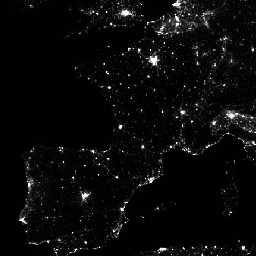Page Summary
-
The NOAA/VIIRS/DNB/MONTHLY_V1/VCMSLCFG dataset provides monthly average radiance composite images using nighttime data from the VIIRS Day/Night Band (DNB).
-
The data is available from 2014-01-01 to 2025-03-01 and is updated monthly.
-
Due to factors like cloud cover and solar illumination, some areas may not have good data coverage in certain months, and the 'cf_cvg' band should be used to identify areas with low observation numbers.
-
Version 1 of this product has been corrected for stray light to extend visible areas and improve dynamic range, but it does not filter out temporary lights or separate lights from background values.
-
The dataset includes bands for average DNB radiance (
avg_rad) and cloud-free coverages (cf_cvg), with a pixel size of 463.83 meters.

- Dataset Availability
- 2014-01-01T00:00:00Z–2025-10-01T00:00:00Z
- Dataset Producer
- Earth Observation Group, Payne Institute for Public Policy, Colorado School of Mines Google Earth Engine
- Cadence
- 1 Month
- Tags
Description
Monthly average radiance composite images using nighttime data from the Visible Infrared Imaging Radiometer Suite (VIIRS) Day/Night Band (DNB).
As these data are composited monthly, there are many areas of the globe where it is impossible to get good quality data coverage for that month. This can be due to cloud cover, especially in the tropical regions, or due to solar illumination, as happens toward the poles in their respective summer months. Therefore it is recommended that users of these data utilize the 'cf_cvg' band and not assume a value of zero in the average radiance image means that no lights were observed.
Cloud cover is determined using the VIIRS Cloud Mask product (VCM). In addition, data near the edges of the swath are not included in the composites (aggregation zones 29-32). Version 1 has NOT been filtered to screen out lights from aurora, fires, boats, and other temporal lights. This separation is under development and will be included in a later version of this time series. Also in development is a method to separate lights from background (non-light) values.
This product is an alternative configuration of the VIIRS DNB using a procedure to correct for stray light. The correction procedure extends visible areas closer to the poles and improves dynamic range. It should be noted some artifacts are introduced due to the procedure used in twilight regions; see reference paper for more details. This product excludes data impacted by cloud cover.
Bands
Pixel Size
463.83 meters
Bands
| Name | Units | Min | Max | Pixel Size | Description |
|---|---|---|---|---|---|
avg_rad |
nanoWatts/sr/cm^2 | -1.5* | 193565* | meters | Average DNB radiance values. |
cf_cvg |
0* | 84* | meters | Cloud-free coverages; the total number of observations that went into each pixel. This band can be used to identify areas with low numbers of observations where the quality is reduced. |
Terms of Use
Terms of Use
Colorado School of Mines data, information, and products, regardless of the method of delivery, are not subject to copyright and carry no restrictions on their subsequent use by the public. Once obtained, they may be put to any lawful use. The forgoing data is in the public domain and is being provided without restriction on use and distribution.
Explore with Earth Engine
Code Editor (JavaScript)
var dataset = ee.ImageCollection('NOAA/VIIRS/DNB/MONTHLY_V1/VCMSLCFG') .filter(ee.Filter.date('2017-05-01', '2017-05-31')); var nighttime = dataset.select('avg_rad'); var nighttimeVis = {min: 0.0, max: 60.0}; Map.setCenter(-77.1056, 38.8904, 8); Map.addLayer(nighttime, nighttimeVis, 'Nighttime');